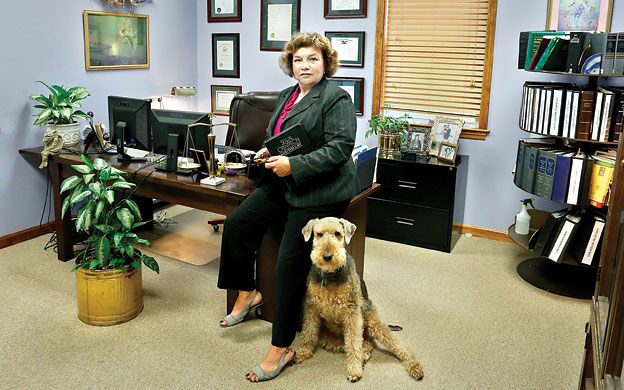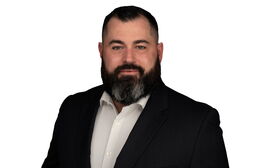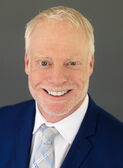Processing Your Payment
Please do not leave this page until complete. This can take a few moments.
- News
-
Editions
View Digital Editions
Biweekly Issues
- December 1, 2025
- Nov. 17, 2025
- November 03, 2025
- October 20, 2025
- October 6, 2025
- September 22, 2025
- + More
Special Editions
- Lists
- Viewpoints
-
Our Events
Event Info
Award Honorees
- Calendar
- Biz Marketplace
Wealth managers see opportunities post-DOMA
 PHOTo / Tim Greenway
Mary-Anne Martell, owner and senior legal counsel at Seacoast Law and Title in Westbrook (with her dog Pauli), offers estate planning and other services to her clients, more than half of whom are gay.
PHOTo / Tim Greenway
Mary-Anne Martell, owner and senior legal counsel at Seacoast Law and Title in Westbrook (with her dog Pauli), offers estate planning and other services to her clients, more than half of whom are gay.
Wealth management has taken on a new immediacy in the past year for same-sex couples following a series of watershed events. Last December, the state of Maine recognized same-sex marriages. This June, the Supreme Court struck down a key provision of the Defense of Marriage Act, known as DOMA, thus allowing federal benefits for same-sex couples who are legally married. And most recently, in late August, the Internal Revenue Service ruled that same-sex couples who are legally married will be treated as married for federal tax purposes, regardless of whether they live in a state that recognizes their marriages.
All those changes are creating opportunities for wealth managers, who are targeting a new customer base that previously had more limited choices in planning their financial future, and who now need professional help to sort through the changes in their legal status and their options.
RBC Wealth Management, Credit Suisse, U.S. Trust and others are honing their skills to take on same-sex couples, with some even offering special training to staff to be cognizant of relationship-specific considerations. The services they're offering range from advice on basic budgeting and merging bank accounts to joint filing of tax returns and estate planning as well as establishing a durable power of attorney. Same-sex marriage is now legal in 13 states and the District of Columbia. Another 10 states are expected to join them, according to NBC News and the advocacy group Freedom to Marry.
“It opened a new can of worms, with [more than 1,100] different rights and responsibilities in the federal code tied to marital status,” says Liz Winfield, a financial adviser with RBC Wealth Management in Portland, about federal recognition of same-sex marriage. “If you get married, you need to talk about how to interact with money. But people would rather clean their oven with their tongue before talking about a budget.”
RBC doesn't offer specific financial packages for same-sex couples, but Winfield says the same guidance for different-sex couples can apply.
“DOMA changed a lot of issues that had to do with there being no recognition,” says Mary-Anne Martell, owner and senior legal counsel at Seacoast Law, a Westbrook firm that offers estate planning and other services. “The rules applied to heterosexuals, not to same-sex couples, so they had to jump through extra hoops. They had no legal standing.”
Winfield experienced that personally. She married her partner, Alice, in 2006 in Montreal (Maine recognized the marriage under a reciprocal relationship with Canada), and says that until the recent DOMA repeal, her mother was her legal next of kin.
“So we did everything we could [before that] to protect our rights as if we were [recognized as] married,” she says.
“Whether married or not, Alice and I owned a house. We made sure the deed was in both names, the mortgage was in both names, and we got powers of attorney to cover finance and health and the legal right to speak for one another, as well as health care proxies, living wills and wills. We got every document we could get. These are things people who aren't married, gay or straight, [still] need to do if they're in a committed relationship.”
One example is that if a same-sex couple owned property and one passed away, the transfer of ownership was taxed before the recent changes.
“Some same-sex couples are together for 20 years and can't discuss their relationship with their families,” says Martell. “It's a hell of a mess when one of them passes.”
But like marriage, the rights and responsibilities now open to same-sex couples require taking the good with the bad. Martell says she has friends who are Maine residents, but who married in Massachusetts and were unable to get a divorce in Maine until the state recognized gay marriage.
“So clients who want to get divorced are now seeing spousal support and division of assets,” says Martell. “It applies to you now, for good and bad.”
A new way of thinking
For many recently married same-sex couples, such considerations are new. Chris Fleuriel, 62, a medical librarian who lives in Brunswick, and her partner, are clients of Winfield who married just 11 days before DOMA was struck down. Before marrying, Fleuriel did her financial planning by herself, mainly in the form of tax-sheltered annuities. She's now looking for better ways to invest that money, and wants to talk to Winfield about topics such as what merging finances with her partner would mean.
“We haven't discussed a lot about wealth management,” Fleuriel says about her partner. “Since we're married, she's now a beneficiary on my retirement accounts. Before that, it was just my children.”
She says she has not yet considered looking over her last three years' tax returns to see if there is any money to recoup if she refiles as a married person. Domestic partners have paid extra income tax in the past if one partner received health insurance through the other, and they weren't able to take the marriage deduction, so some couples might benefit from refiling jointly. It still isn't clear how many years the IRS will allow for refiling.
Fleuriel advises others in her position not to take too long before thinking about their financial future.
“This is an area where financial planners and people like that should be able to get an uptick in their business,” she says.
Fellow newlywed Andy Verzosa, 50, who owns Aucocisco Galleries in Portland, agrees.
“Savvy companies are doing this, if they haven't already started,” he says of wealth planners seeking same-sex couples as clients.
“Your relationship wasn't recognized in society, so legally it wasn't something to think about. Now that has changed,” he says of financial planning. “Not only can you think about it, you're almost compelled to do so.”
Verzosa, who is in a 16-year relationship, married his husband in August and says he is thinking differently now about the future. But he says he still is learning the basics like what it will be like to file taxes together for the first time. He's meeting a bookkeeper soon, and plans to hire a wealth manager.
“You don't hear a lot of examples of how same-sex couples do retirement,” says Verzosa, who expects to pay off the mortgage on his vacation home this year. Before the DOMA change, he had considered either retiring in the property or selling it and living off the proceeds.
“I'm questioning whether to sell my seasonal home and putting those assets in other investment vehicles,” he says. “It could be a significant amount of capital to invest for retirement.”
A growing market
The wealth management field includes financial planners, certified public accountants, estate planning attorneys and others who advise clients how to best manage their money, typically with goals like retirement in mind. More than one such professional might be needed, depending on the client's needs, Winfield says. While the term “wealth management” can connote high-net-worth individuals who have at least $1 million to invest, it also can mean the kind of financial planning done by people with only hundreds or thousands of dollars to invest in an individual retirement account or other investment vehicle.
The idea is building wealth over time, says Winfield.
And while there is only anecdotal evidence that more same-sex couples will seek financial advice, a 2009 study by the Williams Institute at the University of California in Los Angeles predicted by extending marriage rights to same-sex couples, those couples could boost Maine's economy by $60 million over three years, generating $3.6 million in state and local government tax and fee revenues. Most of that was attributed to tourism and weddings, while there was no break out of other services such as financial planning. The study assumed that half of Maine's 4,644 same-sex couples would marry in the first three years they were allowed to do so, and that 15,657 couples from other states would come to Maine to marry.
A more recent Pew Research Center study estimated at least 428 same-sex marriages in Maine (2012-2013) and more than 71,000 nationwide out of a total of 2 million U.S. marriages listed by the U.S. Centers for Disease Control and Prevention.
Retirement is the top concern among the lesbian, gay, bisexual and transgender, or LGBT, community, according to a study released last fall by Prudential. Some 78% of the survey's participants said they already were saving for retirement. “Like most Americans, the LGBT community has a significant confidence gap in whether they will have enough money to last a lifetime. Retirement planning will be among the major financial issues facing the community over the next decade,” the report notes.
Still, LGBT Americans are less confident in financial planning than the general population because their finances, as well as tax, retirement and estate planning, have been complicated by the intricacy of tax and family laws affecting them. “Many indicate they need help with financial and estate planning,” according to the study.
Indeed, same-sex couples now face the same types of financial decisions previously in the realm of different-sex couples, explains Martell of Seacoast Law. “My clients never had to deal with this before, because they didn't think they could get married.”
Martell says 56% of her clientele is gay and has come to her mostly through referrals.
“People want to deal with professionals who are understanding, empathetic and get it,” she says, adding there still is some stigma attached with being gay.
A number of financial companies have established services specifically with same-sex couples in mind, among them Credit Suisse and Bank of America, which has two units that focus on wealth management, U.S. Trust and Merrill Lynch.
“We have an organizational LGBT initiative and materials to educate our staff to be sensitive to those clients,” says Michael McCarthy, managing director and trust fiduciary executive at U.S. Trust in Los Angeles. The initiative was started about three years ago.
McCarthy says the staff goes through an education program that teaches them to be sensitive to the client and to the way in which they refer to themselves and their partners, as well as how open they are about their relationship.
“LGBT clients are underserved in financial wealth management issues,” he adds.
He says same-sex couples are now reviewing their estate plans and preparing documents such as a durable power of attorney for health care and for finances, Health Insurance Portability and Accountability Act access to medical records, hospital visitation prior authorization and paperwork on the disposition of remains.
“The state in which you die governs who has control over your body and the funeral arrangements,” he explains. “You need documents in place that to the greatest extent possible protect you as a couple.”
Paper work
There are key documents and designations same-sex, married couples need for legal and financial decisions:
Your partner
- Cohabitation agreements
- Domestic partnership agreements
- Pre- and post-nuptial agreements
Your children
- Adoption agreements
- Surrogacy
- Guardianship
- Child-care or parenting agreements
Your life and health
- Health insurance
- Life insurance
- Health care proxy
- Living will
- Directing the disposition of your remains
- HIPAA (Health Insurance Portability and
Accountability Act of 1996) authorizations
Wealth planning
- Beneficiary designations
- Wills
- Trusts
- Gifting strategies
- Titling of assets
- Durable power of attorney
Source: U.S. Trust, Bank of America Wealth Management
Mainebiz web partners
Related Content

The Giving Guide
The Giving Guide helps nonprofits have the opportunity to showcase and differentiate their organizations so that businesses better understand how they can contribute to a nonprofit’s mission and work.
Learn More
Work for ME
Work for ME is a workforce development tool to help Maine’s employers target Maine’s emerging workforce. Work for ME highlights each industry, its impact on Maine’s economy, the jobs available to entry-level workers, the training and education needed to get a career started.
Learn More
Groundbreaking Maine
Whether you’re a developer, financer, architect, or industry enthusiast, Groundbreaking Maine is crafted to be your go-to source for valuable insights in Maine’s real estate and construction community.
Learn more-
The Giving Guide
The Giving Guide helps nonprofits have the opportunity to showcase and differentiate their organizations so that businesses better understand how they can contribute to a nonprofit’s mission and work.
-
Work for ME
Work for ME is a workforce development tool to help Maine’s employers target Maine’s emerging workforce. Work for ME highlights each industry, its impact on Maine’s economy, the jobs available to entry-level workers, the training and education needed to get a career started.
-
Groundbreaking Maine
Whether you’re a developer, financer, architect, or industry enthusiast, Groundbreaking Maine is crafted to be your go-to source for valuable insights in Maine’s real estate and construction community.
ABOUT
NEW ENGLAND BUSINESS MEDIA SITES
No articles left
Get access now
In order to use this feature, we need some information from you. You can also login or register for a free account.
By clicking submit you are agreeing to our cookie usage and Privacy Policy
Already have an account? Login
Already have an account? Login
Want to create an account? Register
Get access now
In order to use this feature, we need some information from you. You can also login or register for a free account.
By clicking submit you are agreeing to our cookie usage and Privacy Policy
Already have an account? Login
Already have an account? Login
Want to create an account? Register











Comments